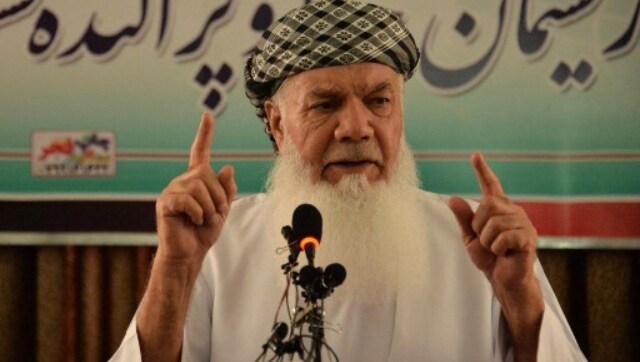
Afghan warlord and former Mujahideen leader Ismail Khan. AFP
Ismail Khan, 75, has for decades been a force in Herat, Afghanistan's third-biggest city that is of huge strategic value partly due to its close proximity to Iran

Afghan warlord and former Mujahideen leader Ismail Khan. AFP
Herat's fall and the capture of Afghanistan's most prominent warlord Mohammad Ismail Khan by Taliban, -- all within a span of few hours -- was succeeded by more bad news for the Ashraf Ghani-lead government as local media reports claimed that all government officials have surrendered to the insurgent group.
These rapid gains come shortly after the fall of Lashkar Gah, the capital of Helmand Province, and Kandahar, the second-largest Afghan city after Kabul.
Buoyed by these wins, the Taliban reportedly claimed that they will acquire absolute control over all of Afghanistan within a week.
Sources from within the militant group, while speaking to CNN-News18 said, "In less than seven days, Taliban will completely takeover Afghanistan, including Kabul." The sources also claimed that they did not wish to unleash violence on the population or to harm any foreign missions of NGOs working in the region. They claimed that they would appreciate the "help of international agencies in the middle of this humanitarian crisis."
Meanwhile, President Ghani, who has been scrambling hard to save his crumbling regime, is expected to address the nation between today and tomorrow in the wake of a near-complete collapse of his control over the country.
He had in the past two days, unsuccessfully tried to unite warlords who had aided the US in ending the barbaric Islamic rule the first time with equal measures of violence. He had also appealed to the US and even India to provide Air combat support to stop the Taliban's gains.
But now with the governors and police headquarters in states all within Taliban control, his efforts seem unlikely to provoke any concrete changes in the bleak position.
Lion of Herat Mohammad Ismail Khan captured
Ismail Khan, 75, has for decades been a force in Herat, Afghanistan's third-biggest city that is of huge strategic value partly due to its close proximity to Iran.
As per Reuters, Taliban insurgents detained the veteran militia commander on Friday after they seized the western city of Herat.
Khan's vast militia had a series of successes against the Taliban when the hardline Islamic group first came to power.
But he was forced to flee to Iran with thousands of his men in 1995 after an ally defected to the insurgents.
He was captured by the Taliban in 1997 when he returned to organise an uprising, but escaped from prison two years later and was at large until the US invasion in 2001.
Last month he was again breathing defiance.
"We will soon go to the frontlines and with the help of God change the situation," Khan, 75, told a news conference.
"We hope that men and women of Herat decide at this moment to support the resistance front to defend their freedom and safeguard their honour," Khan said.
He blamed the government for the rapidly deteriorating situation and urged the military to show more backbone.
"We demand all the remaining security forces resist with courage."
Fall of Herat: All govt officials surrender to Taliban
Afghanistan news media, TOLOnews quoting unnamed sources said all government officials, including governor, police chief, head of the NDS office, Mohammad Ismail Khan, the deputy minister of interior for security, and the 207 Zafar Corps commander have surrendered to the Taliban after Herat fell to the Taliban.
According to News18 sources, the officials have been taken to a different place, however, the Taliban refused to comment on their detention and subsequent whereabouts.
On Friday, after government forces had left the city and Taliban militants had taken control without a battle, the "Lion of Herat" was nowhere to be seen, when reports came out that he has been detained.
Hours after seizing the city, a group of insurgents pulled down an Afghan flag from a police station as cars and bicycles passed in seemingly normal traffic.
Others stood on the bonnet of a humvee vehicle that had been abandoned by the retreating government troops. One insurgent gave the hint of a smile while looking into a camera, with a rocket-propelled grenade on his shoulder.
The white flag of the Taliban waved through the air on a pole pegged to a motorcycle.
Like in other cities lost to the Taliban over the past week, authorities in Herat also claimed that they gave up their posts to avoid bloodshed among civilians.
"We had to leave the city in order to prevent further destruction," a senior security source from Herat told AFP, adding that troops and city officials had retreated to army barracks outside of Herat.
With inputs from AFP